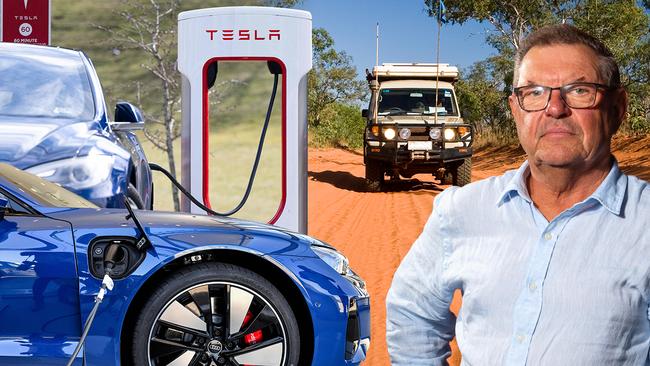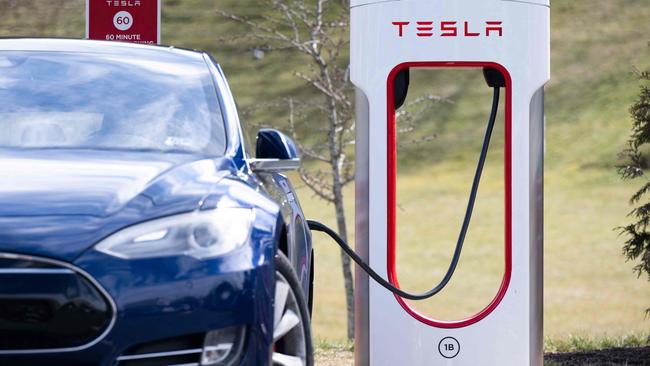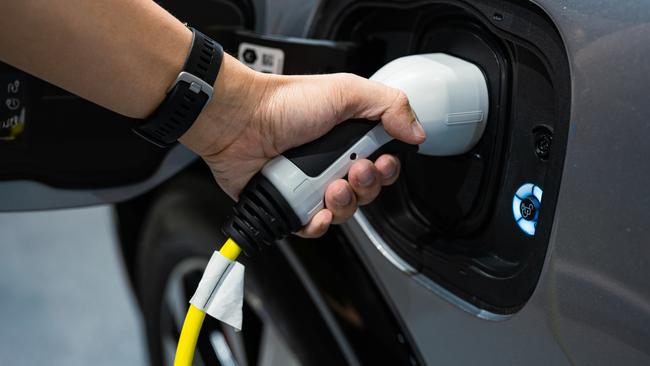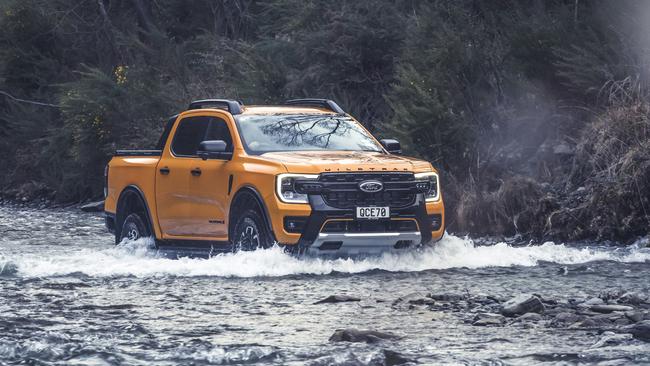Steve Price: Why electric vehicles pose more questions than answers down under
Aussies have always been car people with a road trip mentality, but the push for electric vehicles is now becoming like religious zealotry — and anyone who dares to criticise it is branded a Neanderthal.

Opinion
Don't miss out on the headlines from Opinion. Followed categories will be added to My News.
My first car, a dark blue six-cylinder Holden FC, cost me $50.
The year would have been about 1973 so it was second-hand — 13 years-old in fact. It was the first of four Holdens I owned, explained by the fact that my father was a Holden dealer. I’ve owned a bit of everything since, from a dodgy Alfa Romeo Sud, to an awful Mazda Tribute manual and a Porsche 911.
I have also been lucky enough in my media job to act as an ambassador for Mercedes Benz of Sydney and MB Melbourne, driving everything in their range except for their new series of EVs — electric vehicles.
For some reason the idea that we should all desire to own a Tesla, or some cheaper electric vehicle, has taken hold and if you dare to criticise the push for the electrification of our vehicle fleet you are branded a stupid Neanderthal. It’s become like religious zealotry.
I suspect the same irrational decision-making that grips the climate change zealots is working here and many who go electric might very soon regret it.

The stupidity of the idea that a nation the size of Australia with its spread-out population can become a Norway down-under is absurd. I don’t want to drive a pimped-up golf cart and even if I did the practicality of it in Melbourne simply wouldn’t work.
If these EVs are so great then why are state and federal governments forced to subsidise their purchase price so heavily. Victoria is trailing the other states with subsidies, likely because of budget woes, but even so in this state you get $100 registration discount and are exempt from the luxury vehicle tax. No other way to look at that than it’s a subsidy for wealthy people to buy a fancy car.
In NSW and Queensland, it’s even more generous. NSW will give you a $3000 rebate for the first 25,000 EVs sold at a price cheaper than $68,750 and you pay zero stamp duty for any EV you buy costing under $78,000. Plus, you get discounted registration costs and are allowed – and this is beyond bizarre – to use T2 and T3 traffic lanes without penalty. So, a wealthy Tesla resident of Sydney’s northern beaches can get to work quicker.
Queensland’s EV subsidy is even more generous – a $6000 discount off the retail price for the first 15,000 sold. Even with these subsidies, EVs only make up 2.7 per cent of the vehicle fleet with EV champions gloating that 7.7 per cent of all new car sales this month so far have been EVs. Clearly there is a market for these things but it’s a niche market largely made up of wealthy people trying to make themselves feel better about Global Warming and the use of fossil fuels.

No matter that the materials used to make EV batteries to power these things are being mined in poor African countries using slave labour and the disposal of used batteries is not even being treated as an environmental issue by owners.
It’s the practical issues of owning an EV though that the proponents ignore. No one living in one of the hundreds of thousands of apartments across Melbourne can easily charge an EV, so wouldn’t buy one. The Greenies in North Fitzroy and Preston without off-street parking are no chance unless they work in a building with car park chargers. But even then the number of people wanting to use them would make that a daily exercise in charging anxiety.
Short of a trip to Bunnings to buy the biggest extension cord they have and then draping it out the first-floor window of your two-bedroom, sixties-built apartment and running it across the footpath to your car you can’t keep the thing charged. Even if you are lucky enough to be wealthy enough to buy an EV – and they are starting to come down in price if you don’t mind driving something made in China – and have a home charger in the garage, don’t get too excited.

Take the most affordable electric car on the road – the MG4, with prices starting about $41,000 for the Exite 51. You can get 350km out of a charge – so a third of the way to Sydney – but to fully charge the thing on a wall charger at 6.6kW will take almost nine hours. On the run, a public fast charger, if you can find one and hope it’s working, will take at best 28 and at worst 38 minutes. And that’s if you don’t have to queue for a turn!
Fans of electric cars are obviously the early adopter type personality. Australians have always been car people, car families, our road system and road trip mentality means we love to see our country under our own steam.
The most popular vehicles for Aussie families are either large SUVs or four-door utes.
The electric revolution is yet to deliver an affordable, large family vehicle that will encourage Aussies to give up the Ford Ranger or Toyota Sahara. Outside the capital cities and larger regional towns, EVs are simply impractical.

Their towing ability creates a drag on battery life and the charging infrastructure doesn’t even exist.
Interestingly, the RACV recently released figures on running costs of EVs, busting another myth.
Many people selling or buying a new EV live in some sort of delusional world where because you are not pulling into a petrol station you think running your car is free.
As the RACV revealed, the cheapest MG will still cost you $1149 a month to run, cheaper than a similar petrol or diesel but not free.
Fans of these things also cannot confidently tell you how long the battery life is or what happens when that battery has gone past its use by date.
Insurance in an accident is another grey area and what emergency service workers can do if the vehicle chassis is electrified in a collision.
In recent weeks we have had at least two fires involving EVs and batteries.
I love the sound of a V8 or a flat six and don’t believe fake sound – to pretend you have an engine, not a battery – cut it.
EVs are un-Australian.
Love
• Preliminary final weekend. All on the line for a grand final berth.
• Melbourne Royal Show. Wild rides, showbags and farm life.
• Grand Final parade back on dry land, where it belongs
• Ron Barassi. Not just an icon of footy, but a treasured Australian
Loathe
• State government whacks Victorians trying to get ahead in housing market
• Violence on the streets, with Victorians more in fear every week.
• Victoria’s debt - now double NSW
• Bayside Council advocating for a change to Australia Day date. Just do your job.
Originally published as Steve Price: Why electric vehicles pose more questions than answers down under



